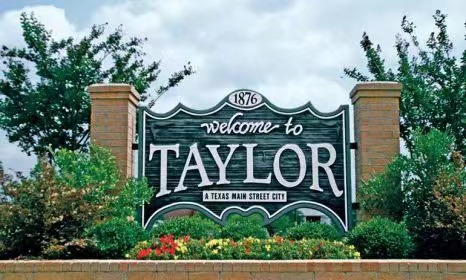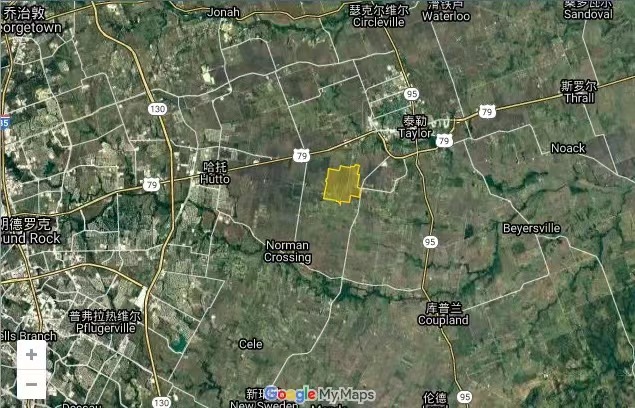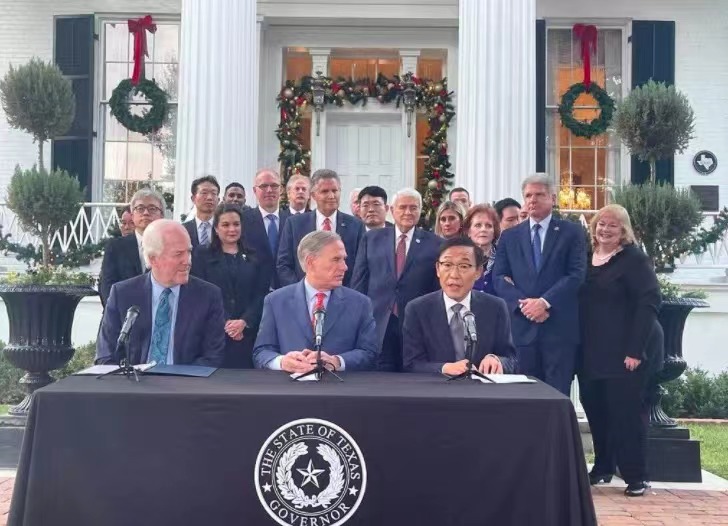Samsung Electronics Co. Ltd. has officially pledged to invest at least $17 billion into a chipmaking plant in Taylor, a small city northeast of Austin, which will send shockwaves through the regional economy for decades to come.

Samsung promises to create at least 2,000 direct jobs, at least 6,500 construction jobs and a 6-million-square-foot factory on roughly 1,200 acres between Taylor and Hutto. The factory will produce the South Korea-based company’s most advanced computer chips yet.
It’s a transformative project for Taylor, which had a population of just 16,267 in 2020, according to U.S. Census Bureau data. The tech giant also considered Austin, Phoenix and upstate New York during the past 10 months, and Williamson County leaders have said Taylor was initially in last place.
For an exclusive look at how Williamson County and Taylor officials scored the mammoth deal, click here.
Samsung officials and Gov. Greg Abbott announced the final decision Nov. 23 following weeks of speculation. Abbott called the deal “the largest foreign, direct investment in the state of Texas, ever.”
Other regional economic development officials have also offered thoughts on the game-changing project.
“Williamson County has again proven to be a leader in attracting the world’s top technology companies. To Samsung, I want to say ‘Welcome Home,’” Williamson County Judge Bill Gravell said in a statement. “With the addition of Samsung on the east side of our county, Apple on the west side and Dell Technologies world headquarters in the center, Williamson County is now home to the technology superhighway of the world.”

Kinam Kim, vice chairman and CEO of Samsung Electronics Device Solutions Division, said in a statement that the company is “laying the groundwork for another important chapter in our future.”

“With greater manufacturing capacity, we will be able to better serve the needs of our customers and contribute to the stability of the global semiconductor supply chain,” Kim said. “We are also proud to be bringing more jobs and supporting the training and talent development for local communities, as Samsung celebrates 25 years of semiconductor manufacturing in the United States.”
Samsung has secured hundreds of millions of dollars in incentives from Taylor and Williamson County officials, largely in the form of property tax abatements, in exchange for the project. Samsung will also be eligible for $27 million in grants from the Texas Enterprise Fund, according to the governor’s office. Federal incentives are also expected.
Construction on the facility will start early next year, and it will be operational by the second half of 2024.
“This is a serious win for the state of Texas, and a particularly special win for Central Texas,” said Gary Farmer, chairman of Opportunity Austin, the economic development initiative of Greater Austin Chamber of Commerce. “This investment will keep Central Texas at the forefront of the semiconductor manufacturing business. It will amplify the talent we have in the region and amplify our supply chain. It’s going to create great jobs for a lot of people, and it salutes our innovative culture. It does a lot of positive things when you bring the most sophisticated semiconductor fabrication plant in the world to Central Texas. That’s pretty special.”
In Taylor, there has been some trepidation but also ample excitement about the prospect of Samsung choosing the town. It has largely missed out on the tech-fueled boom of the Austin metro in recent decades.
“Samsung’s decision to locate its cutting-edge semiconductor fabrication plant in Taylor is the single most significant and consequential development for the local economy since the International & Great Northern Railroad laid tracks here in the 1870s,” Taylor Mayor Brandt Rydell said in a statement. “The City of Taylor is honored to have been selected by Samsung as the site for this critically important project, and we look forward to a long-lasting and mutually-beneficial relationship between our community and the company.”
Samsung’s decision puts Central Texas on the cutting edge of semiconductor production at a time when the world is facing a shortage of chips used in everything from cars to home appliances to computers. Some analysts have said those shortages could drag on for years. The $17 billion U.S. plant is also expected to help Samsung compete with rivals such as Taiwan Semiconductor Manufacturing Company Ltd. and Intel Corp.
“Samsung’s selection of Taylor for a new multibillion-dollar plant is a huge win for all of Central Texas,” Ed Latson, executive director of the Austin Regional Manufacturers Association, said in a statement. “A facility of this magnitude is a generational investment that will make a dramatic economic impact in the community and change lives by creating high-paying jobs for Texans at all education levels. And the technology being produced will keep us at the leading edge of innovation in electronics.”
Samsung already has a massive chipmaking campus in North Austin, where the company has invested $17 billion over the last 25 years and employs thousands. Samsung’s continued investment in the region highlights on an international scale just what Central Texas has to offer, officials said.
“Samsung Electronics has clearly now demonstrated to the world what it thinks of our region, the people that make up our workforce and the innovative spirit of our business community,” Laura Huffman, president and CEO of the Greater Austin Chamber of Commerce, said in a statement. “We are ecstatic about the thousands of jobs — both permanent and construction — that will be created by this project and the untold opportunities that will be a result of this announcement. This is a momentous day and I know our region will rise to the occasion as it has done countless times over the past two decades.”
This also forges deeper ties between the Austin economy and Asia, said Fang Fang, president and CEO of the Greater Austin Asian Chamber of Commerce.
“We are so excited to celebrate this expansion with Samsung. Having a global corporation based in Asia investing in our region so much is important because it demonstrates a link between our heritage and our home here in Austin,” Fang said in a statement. “It also would be a strong signifier to other Asian-based companies that there is a great opportunity here in Central Texas including a wealth of talent and a community that embraces good corporate citizens regardless of where they are headquartered.”
Even after incentives are considered, local officials in Taylor say the tax revenue paid by Samsung on the factory will benefit government bodies. When Taylor Independent School District approved Chapter 313 incentives for Samsung earlier this month, Superintendent Devin Padavil imagined being able to spend more on infrastructure and salaries.
“Taylor ISD and Taylor, Texas are honored and proud to be selected as the home for the new Samsung Semiconductor Plant in North America,” Padavil said in a statement after the announcement. “Our partnership with Samsung will provide us an opportunity to transform the lives of our students through learning opportunities, internships, resources and financial support. We are preparing our children to contribute and compete in a global society, and in many ways, Samsung is bringing a global society to them.”


